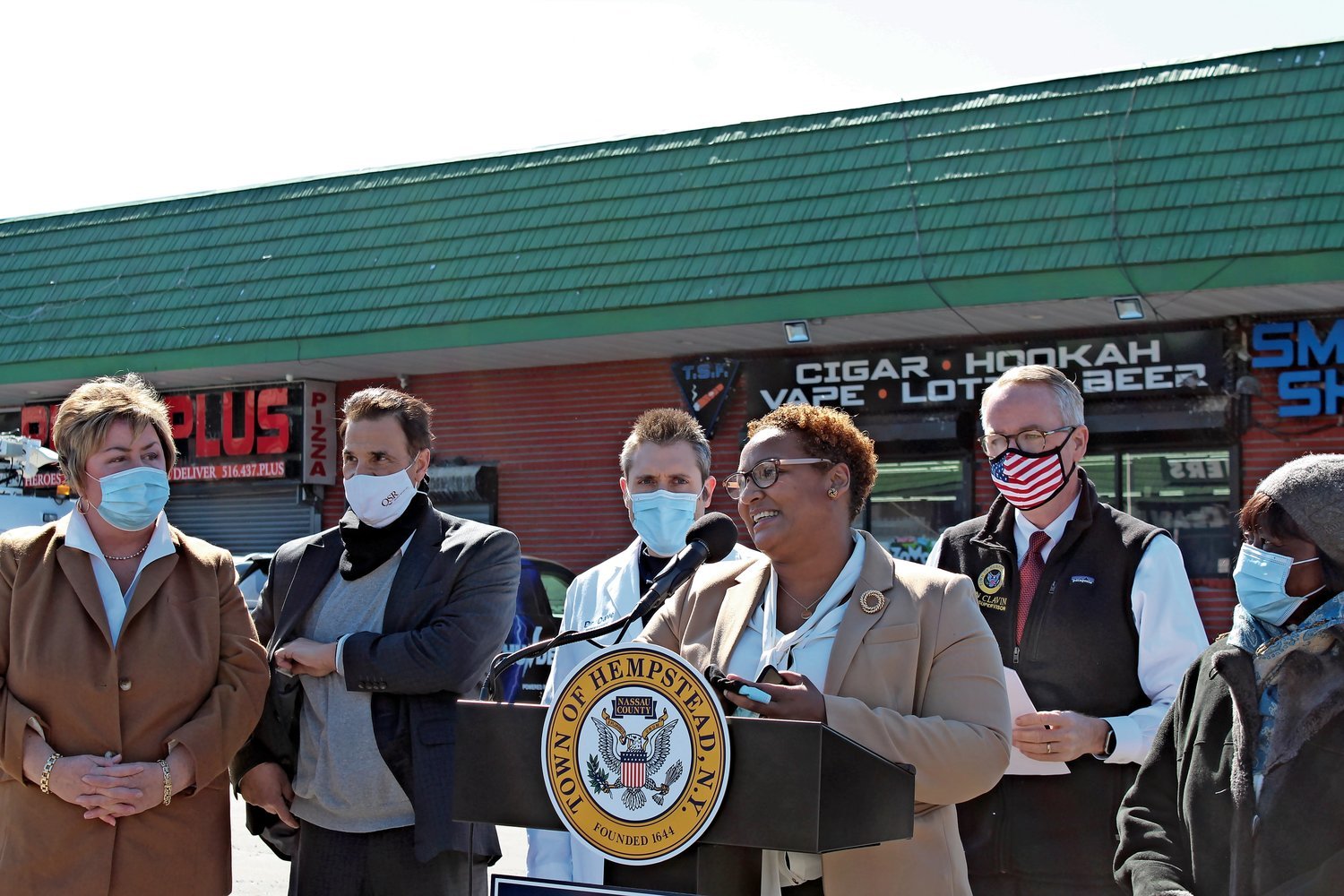Seafordites react to law that restricts vape sales in Hempstead
Hempstead law targets underage vaping
Hempstead Town Supervisor Donald Clavin announced on March 8 that the Town Board would enact legislation restricting where electronic cigarette stores could operate.
The legislation would prohibit the sale of e-cigarette or vaping products within 1,000 feet of a school, playground or park, and would change the town’s zoning laws to restrict those businesses to light manufacturing or industrial zones.
Donna Jebaily, a Seaford parent, said she supported the legislation. “I feel being too close to the school is just a little too close for comfort,” she said. “It’s just easier advertisement for the kids if it’s that easily available.”
The legislation was inspired by Tiffany Capers, who stopped in at the town’s tax office a year and a half ago, when Clavin, then the receiver of taxes, had just been elected town supervisor, to show him how vape shops were targeting teenagers with their advertisements and to express her concern about a shop that had opened across the street from Elmont Memorial High School.
Clavin’s staff spent over a year collaborating with Capers on the issue.
“They’re putting them near these schools for a reason, folks,” Clavin said of the vape shops, noting that they could be found near many of the town’s 36 high schools. “They’re targeting these areas because they want to get them hooked on this stuff very, very young, and this legislation is clearly going to take [them to] task and address that.”
The proposed law will be put to a vote on March 23. If it passes, the zoning changes would be enacted next Jan. 1, and two months earlier, on Oct. 31, the restrictions on where vape shops can operate would go into effect.
“I know kids — if they want to get it, they can get it anywhere,” said Jebaily. “But I just feel being that close to the school is their way of marketing in a way for the kids, not intentionally, maybe, but it’s just a little bit easier to bring it to the kids’ attention that maybe didn’t think about vaping.”
Teen use among eighth- through 12th-graders has more than doubled since 2017, according to the 2019 National Youth Tobacco Survey, with 27.5 percent of high-schoolers and 10.5 percent of middle-schoolers reporting using e-cigarettes. More than 20 percent of high-schoolers reported vaping on a nearly daily basis.
The Town Board has since created an Anti-Vaping Action Plan, with increased code enforcement efforts, an educational anti-vaping forum series at local schools and libraries, and a multimedia campaign. In addition, it has passed laws requiring “No Vaping” signs at town parks and beaches, and requiring businesses that sell vape pens and e-cigarettes to post signs explaining their potential health hazards.
“These are very dangerous nicotine delivery devices,” said Town Medical Director Dr. Dave Neubert. “The companies that make these, they make them so they deliver nicotine, a highly addictive chemical, and they’re designed to deliver that . . . into the bloodstream, where people get a very quick high off of it and get very quickly addicted to it.”
The chemicals in these products, which can cause serious lung damage and cardiovascular problems, go unregulated, Neubert said. And since the coronavirus pandemic began, the Truth Initiative — an organization that promotes tobacco-free lives — has reported that those who have used e-cigarettes are five times more likely to contract Covid-19 than those who do not use tobacco products, and that those who use both e-cigarettes and cigarettes are nearly seven times more likely to contract the disease.
“That’s why it’s just so important that we have community activists, and we have the Town Board, and we have our medical team working together to put laws like this out there,” Neubert said, “because it’s protecting our children, it’s protecting everyone around us and it’s the right thing for town government to be doing.”
Seaford Schools Superintendent Adele Pecora said that the school district would always support any legislation that would prohibit the sale of vaping products near schools. “The growing use of these devices by our students in recent years is concerning, and further restricting the sale would be a positive step forward,” she said.
There are at least three shops in Seaford that sell vaping and e-cigarette products, but Jebaily and Seaford Chamber of Commerce President Nick Bilotta, a father himself, have not noticed young people using these products in a few years.
But Bilotta agreed that vape shops should not be close to schools. “I do think it’s dangerous that kids start at a young age,” he said. “Near a school is definitely not the right place for one of them . . . because I don’t want my kids to do that.”






